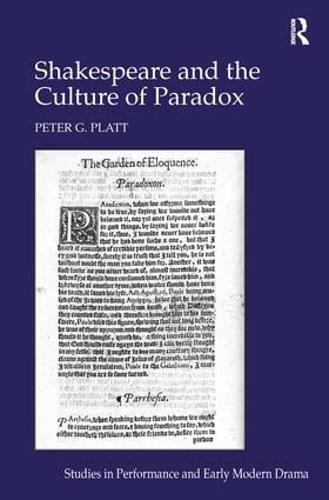Full Product Details
Author: Peter G. Platt ,
Dr. Helen Ostovich
Publisher: Taylor & Francis Ltd
Imprint: Routledge
Edition: New edition
Weight: 0.635kg
ISBN: 9780754665519
ISBN 10: 0754665518
Pages: 264
Publication Date: 17 February 2009
Audience:
College/higher education
,
Professional and scholarly
,
Undergraduate
,
Postgraduate, Research & Scholarly
Format: Hardback
Publisher's Status: Active
Availability: In Print

This item will be ordered in for you from one of our suppliers. Upon receipt, we will promptly dispatch it out to you. For in store availability, please contact us.
Reviews
'Readers and audiences have often sensed, with mingled pleasure and uneasiness, that all of Shakespeare's plays, and not merely a designated few, are what have been called problem plays, plays that do not endorse settled positions, embrace firm resolutions, or decisively clarify ambiguities. In this rich and thoughtful book, Peter Platt explores the intellectual, moral, and aesthetic culture that reveled in paradox and dwelt in the uncertainties, contradictions, and doubleness of the world. Writing in the wake of deconstruction and new historicism, Platt is the worthy successor of the pioneering work of Rosalie Colie.' Stephen Greenblatt, Harvard University, USA 'This is a very stimulating, wide-ranging account of the fascination that paradox held for an age increasingly alert to the discovery of the unexpected - from both old and new cultures - and of the ways in which paradox - verbal, visual, conceptual, performative, and intersubjective - informs Shakespeare's drama and his theater. Among its many virtues, it offers not only historical and theoretical purchase on the phenomenon of paradox, but also sustains a lively engagement with ongoing scholarly debate about the meaning of paradox and its functions in Shakespeare, thereby provoking the reader to participate in the critical discourse. The book will interest everyone who seeks to understand the often puzzling antithetical character of much Renaissance literature - and, a fortiori, of Shakespeare's work for the theater.' Joel B. Altman, University of California, Berkeley, USA 'Reading Peter Platt's Shakespeare and the Culture of Paradox, I find it hard to imagine a more sure-handed and thorough treatment of the figure of the paradox, not to mention one paired with intelligent and fascinating criticism of Shakespeare's plays. The reader will certainly learn much about paradox in this volume; she will learn quite a bit about Shakespearean drama, too.' Doug Eskew, Appositions 'As Platt acknowledges, he casts his net much wider even than Rosalie Colie's classic work on this subject, which focuses on paradox as a rhetorical trope. Platt posits a much broader culture of paradox . He also adds to the humanist scholarship of Colie a multiplicity of approaches including deconstruction, feminist theory and cultural materialism.' Times Literary Supplement 'All told, Platt has written a resonant, graceful book that informs and delights.' Renaissance Quarterly 'Platt is extremely well informed about the background of theory on paradox and has animated his rigorous study of it with his own intense thought about the subject, building on his knowledge of the marvellous and wondrous, which ideas he ties skilfully here. His having marshalled so many thinkers on paradox and summarized, synthesized, and oragnised them so effectively is in itself an achievement and makes the book valuable.' Sixteenth Century Journal 'Besonders uberzeugend... ungewohnlich klar formulierte Zusammenschau bereits etablierter Deutungen und Perspektiven.' ['Especially convincing... an exceptionally clearly formulated synopsis of established interpretations and perspectives.'] Shakespeare Jahrbuch 2012
'Readers and audiences have often sensed, with mingled pleasure and uneasiness, that all of Shakespeare's plays, and not merely a designated few, are what have been called problem plays, plays that do not endorse settled positions, embrace firm resolutions, or decisively clarify ambiguities. In this rich and thoughtful book, Peter Platt explores the intellectual, moral, and aesthetic culture that reveled in paradox and dwelt in the uncertainties, contradictions, and doubleness of the world. Writing in the wake of deconstruction and new historicism, Platt is the worthy successor of the pioneering work of Rosalie Colie.' Stephen Greenblatt, Harvard University, USA 'This is a very stimulating, wide-ranging account of the fascination that paradox held for an age increasingly alert to the discovery of the unexpected - from both old and new cultures - and of the ways in which paradox - verbal, visual, conceptual, performative, and intersubjective - informs Shakespeare's drama and his theater. Among its many virtues, it offers not only historical and theoretical purchase on the phenomenon of paradox, but also sustains a lively engagement with ongoing scholarly debate about the meaning of paradox and its functions in Shakespeare, thereby provoking the reader to participate in the critical discourse. The book will interest everyone who seeks to understand the often puzzling antithetical character of much Renaissance literature - and, a fortiori, of Shakespeare's work for the theater.' Joel B. Altman, University of California, Berkeley, USA 'Reading Peter Platt's Shakespeare and the Culture of Paradox, I find it hard to imagine a more sure-handed and thorough treatment of the figure of the paradox, not to mention one paired with intelligent and fascinating criticism of Shakespeare's plays. The reader will certainly learn much about paradox in this volume; she will learn quite a bit about Shakespearean drama, too.' Doug Eskew, Appositions 'As Pl
Author Information
Peter G. Platt is a Professor of English at Barnard College. He is the author of Reason Diminished: Shakespeare and Marvelous and the editor of Wonders, Marvels, and Monsters in Early Modern Culture.




